“What building a state and what building a society means … is for people to come together, discuss, and agree on a shared way forward.”
“When they come to power through military means, they tend to then rely on those same instruments to wield power.” —Peter Biar Ajak
Independence!! A war won; a people freed. New challenges, but also new possibilities. “Our people were overjoyed … It was an amazing achievement after enormous suffering and sacrifice. … it was something beyond what words can describe,” says Peter Biar Ajak, a young leader from South Sudan, who was imprisoned for his political activism and then escaped a hit squad before he found exile in the United States. South Sudan achieved its independence in 2011—but the exaltation soon turned to ashes: “The last nine years have been absolutely awful for our people.”
Why? “We had a leadership that did not have a vision, a leadership that could not organize and mobilize our people to discuss what sort of society and what sort of state that they wanted to create,”Ajak asserts in a New Thinking for a New World conversation with Alan Stoga. “Instead of shepherding our people toward a new future, the leadership became focused on entrenching itself in power, in looting resources.”
The backstory, he explains, is that the leader of South Sudan’s revolution, John Garang de Mabior, mobilized supporters with the vision that Sudan was built on “the domination of one religion, one ethnic group.” Breaking free of that oppression was the motivating force of the revolution, but Garang died before he could articulate a more positive vision. And, Ajak argues, that’s the problem: “We are a country that has not gone through the basics of forging a shared future and a shared society. What is required is for our people to have that conversation to discuss what sort of society they want to create, what sort of state that they want to create.”
Ajak recognizes that what has derailed South Sudan’s path towards democracy is common to too many Central and East African countries. Revolutionaries who come to power through what he calls “militarized politics” naturally see force as the primary means of retaining their power. This produces a “politics of violence, because the only way in which that can be effectively challenged is through violence.” The leaders who fought for independence “understand destruction; they used destruction as a tool for gaining liberty.”
The problem is thus twofold. On the one hand, “violence is extremely disempowering,” Ajak says, because it precludes any mobilization of people through consensus and discussion. On the other, a new country like South Sudan “has to be built, and these guys are not builders; they understand [only] destruction.” He argues that revolutionary leaders—in his own country and elsewhere—pervert power to sustain themselves in office and basically “pretend that politics is taking place.”
Fragile States in Africa Today
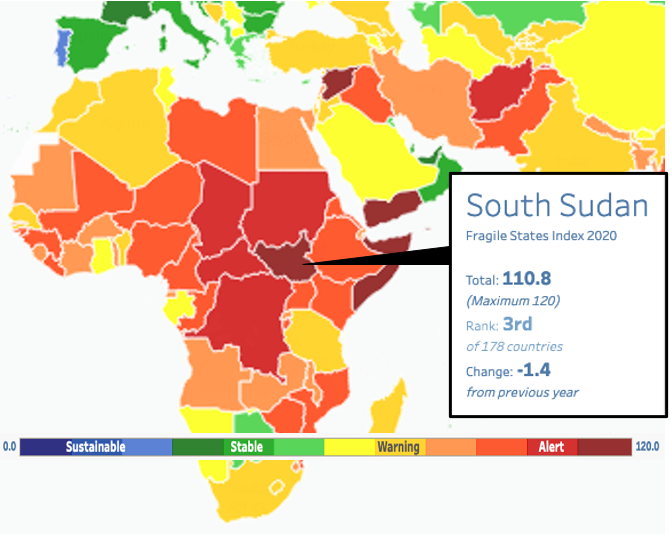
*Source: Fund for Peace, Fragile States Index 2020
For Ajak, replacing that faux politics requires a real conversation among citizens to create “a shared vision for society.” In effect, he argues that what is needed is a “social contract … negotiated by everyone, by all the people. It’s something that has to be widespread.” That’s hard enough, but Ajak is persuaded there is a bigger problem: “A social contract is … something that is living, that is negotiated and renegotiated from generation to generation, because challenges change, needs change, aspirations change.” In other words, a successful, sustainable democracy requires the continuous engagement of citizens who constantly renew the social contract with their leaders.
That need for dynamism creates another challenge that is particularly acute in Sub-Saharan Africa, where the median age of leaders is above 60 and of citizens is under 20. Ajak has been criticized for advocating what he calls “generational exit” which, at first blush, runs counter to Africa’s traditional reverence for the wisdom of elders. He is eager to clarify: “What I’m talking about is that every once in a while … there are generational challenges … that only can be dealt with by one generation … around which the rest of the society mobilizes.”He goes on to argue that, “The challenge that South Sudan faces now is the challenge of rebuilding… It is not only about the physical building but [the building of] even the emotional, the spiritual.” In contrast to those who only know leadership through destruction, “People in our generation have a better idea of what it requires to build things, so we need the youth, the emerging leaders to take the lead while the elders and the rest of the people organize around us and help so that we are able to collectively achieve this.”
Though when Ajak cuts to the chase and concludes, “you need a new generation that can take leadership,” it is easy to see how an older, empowered generation might disagree.
These may seem like far-off concerns. South Sudan is a small, conflicted, remote country—so why should the rest of the world care about its future, or the future of its equally remote, conflicted neighbors? Ajak has two practical answers.
First: migration from Africa to Europe. “When you talk about migration, it is not just appearing from nowhere,” says Ajak. “The population is expanding enormously in our part of the world. People are seeing what is happening in other parts of the world … and they are voting with their feet. Because if they can’t vote and express themselves in their countries, they’re going to find whatever way that they can to move on to Europe and to other parts of the world.”
And second: the strategic interest of Great Powers in South Sudan and the horn of Africa. The United States, China, and Russia have military bases in Djibouti; Americans and Chinese are competing to support various regional governments, regardless of their democratic credentials; the Red Sea and the Gulf of Aden are important trade routes; and terrorist havens like those of Yemen and Somalia generate regional and even global problems. From Ajak’s perspective, the emergence of real, participatory democracy in East Africa may be a lower priority for policy makers in Washington, Beijing, Moscow, or other far away capitals.
At the end of the day, Ajak believes that Africans must solve African problems. Using the language of an earlier generation, but with a new definition, he insists, “In my view, Pan-Africanism is about taking control of ourselves and our destinies, having a different vision about our economies so that we are in control of our factories and of our production.”
He explains that, “I have had this discussion with … some of my friends across Africa who are now standing up and challenging these old generations of Pan-Africans. It’s not just about using the same terminologies and language. It’s about really offering ideas that really mark the difference in time and the difference in priorities.”
Ajak may be in exile far away from his homeland—but he is an optimist, despite the many challenges. “I think the future for South Sudan is still bright,” he says. “We have a very young population, and we have people who are absolutely resilient. We have shown through our long struggle that our people can go that extra mile that many people cannot. We have a country that is blessed with enormous resources. We have the Nile. We have our land. We have oil deposits in the country. So the future can still be made.”
And Ajak expects to be part of the making.
Let us know what YOU think in the comments below.
Peter Biar Ajak recently spoke with Alan Stoga as part of the Tällberg Foundation’s “New Thinking for a New World” podcast series. Hear their whole conversation below, or find us on a podcast platform of your choice (Itunes, Spotify, Acast, Stitcher, Libsyn).
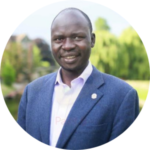 Peter Biar Ajak is the Chairman of the South Sudan Young Leaders Forum, Senior Advisor to the International Growth Centre, and Founder of the Juba-based Center for Strategic Analyses and Research. Peter was previously the In-Country Economist for the World Bank and Coordinator of Policy and Strategy in the Office of the Minister of National Security in the Office of the President. In these roles, he facilitated the creation of South Sudan Development Plan, South Sudan Growth Strategy, and South Sudan Vision 2040 and he drafted South Sudan’s White Paper on Intelligence & Security, the National Security Policy, and the National Security Act. Before that, as South Sudan’s independence referendum approached in 2011, Peter founded South Sudan Wrestling Entertainment (SSWE), a private company that uses the South Sudanese indigenous sport of wrestling to promote peace and reconciliation among the tribes of South Sudan. Peter received his BA in Economics from LaSalle University, Master of Public Administration in International Development ((MPA/ID) from Harvard University’s John F. Kennedy School of Government, where he was a Public Service Fellow, and will receive his PhD in Politics & International Studies from Cambridge University in October 2020. He spent 18 months in jail as a political prisoner for his criticism of South Sudan’s president, Salva Kiir.
Peter Biar Ajak is the Chairman of the South Sudan Young Leaders Forum, Senior Advisor to the International Growth Centre, and Founder of the Juba-based Center for Strategic Analyses and Research. Peter was previously the In-Country Economist for the World Bank and Coordinator of Policy and Strategy in the Office of the Minister of National Security in the Office of the President. In these roles, he facilitated the creation of South Sudan Development Plan, South Sudan Growth Strategy, and South Sudan Vision 2040 and he drafted South Sudan’s White Paper on Intelligence & Security, the National Security Policy, and the National Security Act. Before that, as South Sudan’s independence referendum approached in 2011, Peter founded South Sudan Wrestling Entertainment (SSWE), a private company that uses the South Sudanese indigenous sport of wrestling to promote peace and reconciliation among the tribes of South Sudan. Peter received his BA in Economics from LaSalle University, Master of Public Administration in International Development ((MPA/ID) from Harvard University’s John F. Kennedy School of Government, where he was a Public Service Fellow, and will receive his PhD in Politics & International Studies from Cambridge University in October 2020. He spent 18 months in jail as a political prisoner for his criticism of South Sudan’s president, Salva Kiir.
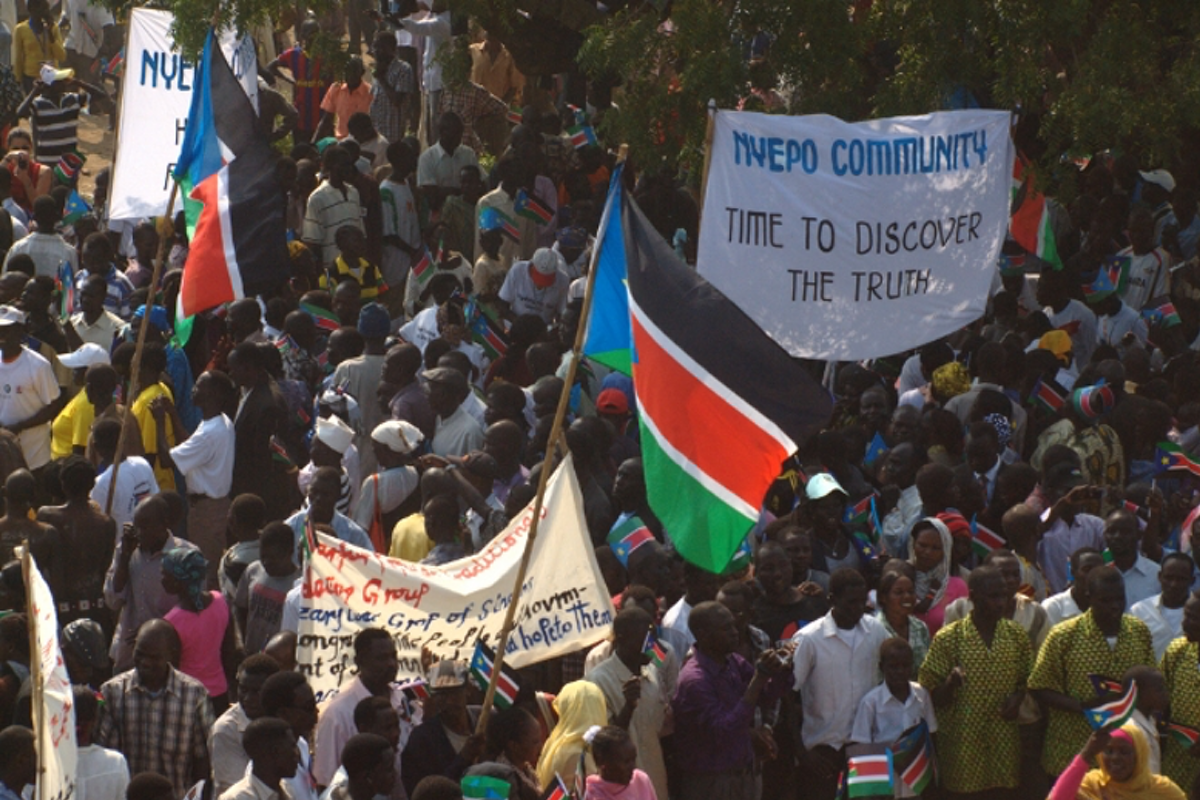
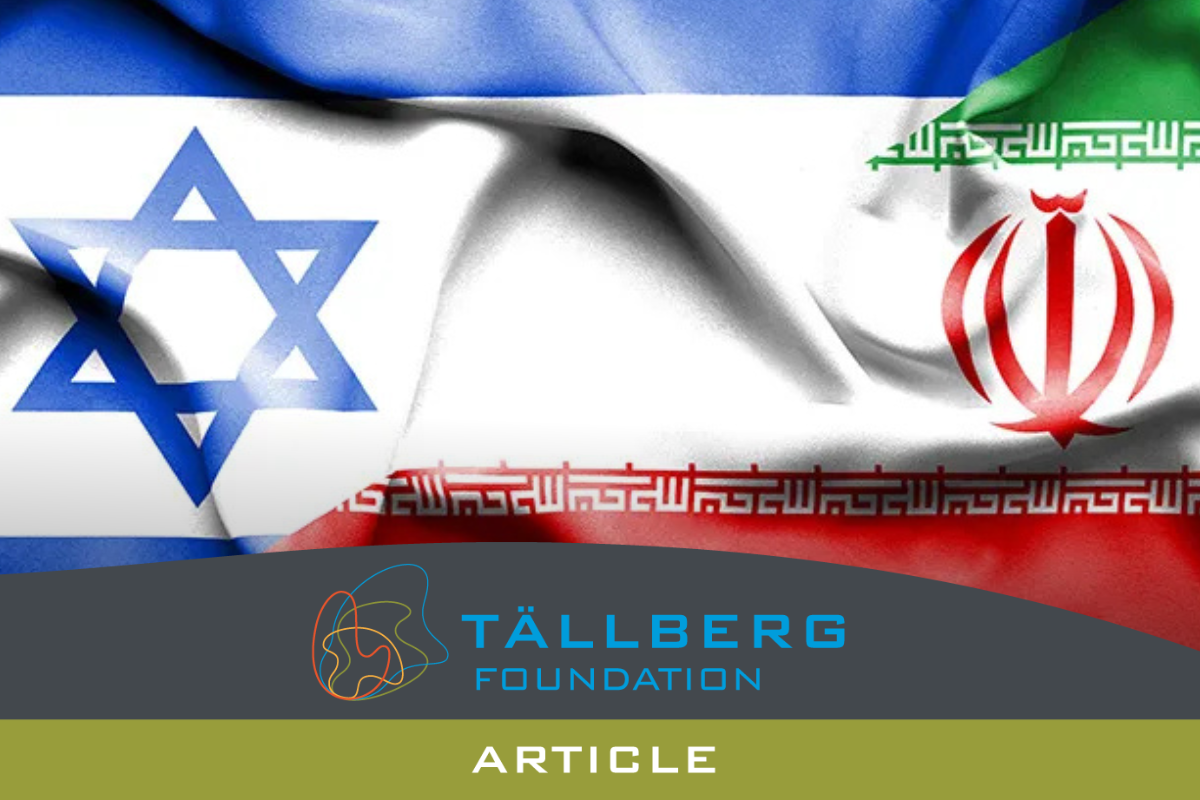
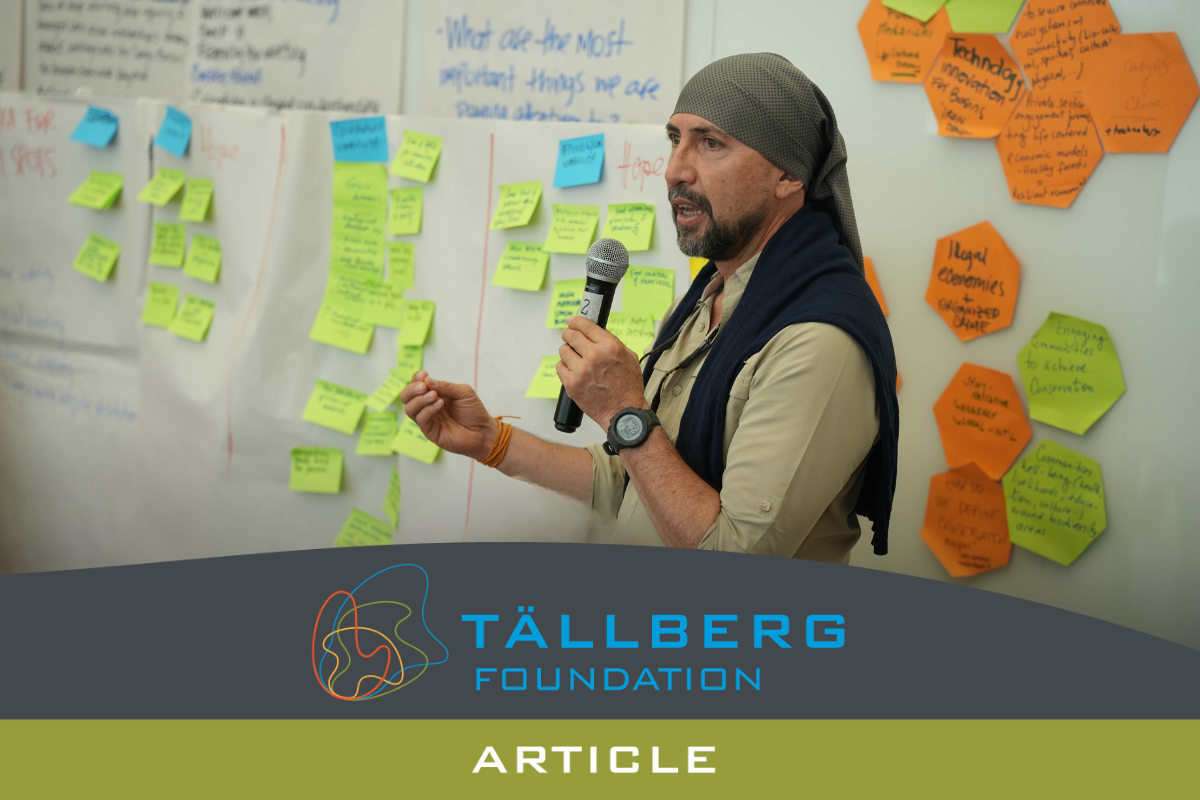


This is true: power should be to the people. I came to know there is a peace agreement in your country. Best of luck to South Sudan in her efforts for peace and best of luck for you Ajak …
Tällberg Foundation
Theme: “Power to the People”
“What building a state and what building a society means … is for people to come together, discuss, and agree on a shared way forward.” – Peter Biar Ajak
Hello!
I believe that before start any political enterprise to implement a political strategy for the change of the failed System in a State, one must conceptualize the context and the geopolitical conjuncture of the moment.
When we talk about a new generation or a generational conflict, it is obvious that we are necessarily referring (and in relation to) to classical political thought before September 11 and the “New World Disorder” that the world is currently experiencing, where political thought was more or less rational and relatively pragmatic.
Unfortunately the world has changed from top to bottom and the new generations have become, for the most part, hostages of the political and ideological manipulation of lobbies, secret sects and obscure clans.
Thus, if a leader, who has a vision and a political project to make the change a reality, wants to stand out to promote his ideas, he suddenly becomes an embarrassing element that everyone wants to neutralize or cut down.
In this case the populations do not follow if there are no material interests and immediate benefits. So, to make any political project a reality, you need, above all, material and financial means and afterwards human resources.
The manipulation of masses and opinions has made genuine and original leaders and pioneers rare. Thus, most of the crowds and supporters are fabricated by the media and dark clans.
The pioneers, all alone, can do nothing if there is no financial means, since the peoples have lost many of those moral values of yesteryear which make activists and supporters of a cause remain faithful and do not betray the cause.
In recent times, failed revolutions and civil wars have shown us how much people are divided into sects and ethnic groups exposed to all temptations and unnatural ambitions under the guise of human rights.
Also, easy gain, privileges and bargain opportunities have meant that people are no more interested in ideals, ideas and principles than in immediate interests & benefits (material & financial).
Therefore, the challenges facing young African leaders are enormous and manifold. And, therefore, the priority of priorities, in terms of governance in African States, comes down to the following major political projects:
1- The change of archaic and obsolete systems
2- Changing outdated political behavior
3- The change in governance styles and methods
4- The change of laws and rules of Governance
5- Global cooperation with Western countries
6- The promotion of the policy of relocation of companies from Western countries to African countries
7- The promotion of a new policy of education, health, employment and demography
As it is not possible to detail all these ideas and concepts here in this forum, I suggest to my African friends to read my books which include very important strategic political themes which touch on the concept of “good governance”, on the concept of the “interdependence” between States & Governments, the concept of “global cooperation” between African countries and Western countries, the concept of “relocation of companies” to African countries, etc…
However, the success and victory of any political enterprise to change the Governance System in African countries stay subordinated to the implementation of a comprehensive cooperation policy with Western countries for the transfer of technology, know-how, experience and financial contributions.
But African countries must know how to surpass themselves and get out of their sterile fratricidal struggles, their sectarian and ethnic egoisms and these destructive civil wars for absurd considerations of tribalism, religion or ethnicity.
Abderrahmane AMROU
The link to my books on Amazon:
https://www.amazon.fr/s?k=Abderrahmane+Amrou&i=stripbooks&__mk_fr_FR=%C3%85M%C3%85%C5%BD%C3%95%C3%91&ref=nb_sb_noss